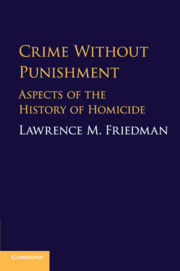Description
Crime without Punishment
Aspects of the History of Homicide
Author: Friedman Lawrence M.
Explores different examples of unpunished homicides and what these tell us about the interaction of law and society.
Language: English
Subject for Crime without Punishment:
Approximative price 28.98 €
In Print (Delivery period: 14 days).
Add to cart
Crime Without Punishment
Publication date: 08-2019
Support: Print on demand
Publication date: 08-2019
Support: Print on demand
Approximative price 91.54 €
In Print (Delivery period: 14 days).
Add to cart
Crime Without Punishment
Publication date: 05-2018
152 p. · 15.8x23.5 cm · Hardback
Publication date: 05-2018
152 p. · 15.8x23.5 cm · Hardback
Description
/li>Contents
/li>Biography
/li>
In this compelling book, Lawrence M. Friedman looks at situations where killing is condemned by law but not by social norms and, therefore, is rarely punished. He shows how penal codes categorize homicides by degree of intent, which are in turn based on society's sense of moral outrage. Despite being officially defined as murder, many homicides have historically gone unpunished. Friedman looks at early vigilante justice, crimes of passion, murder of necessity, mercy killings, and assisted suicides. In his explorations of these unpunished homicides, Friedman probes what these circumstances tell us about conflicts in social and cultural norms, and the interaction of law and society.
Introduction; 1. Popular justice and injustice; 2. The unwritten law; 3. Dead on arrival; 4. The quality of mercy; 5. Black swans; 6. The meaning of unwritten law.
Lawrence M. Friedman is Marion Rice Kirkwood Professor at Stanford Law School, Stanford University, California. He has written and edited over forty books on legal history and the relationship between law and society.
© 2024 LAVOISIER S.A.S.
These books may interest you

When Men Murder Women 78.94 €



